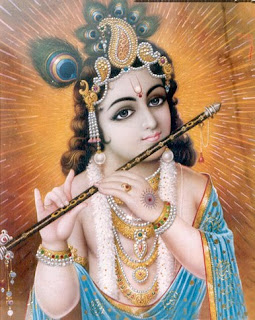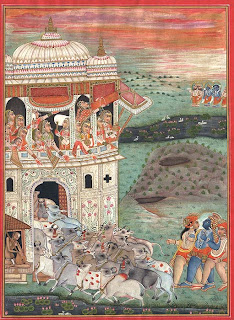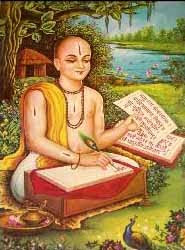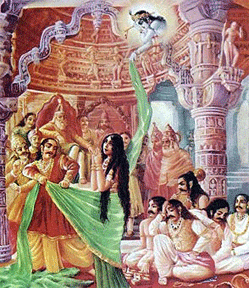
Friday, August 5, 2011
Shri Venu Geet: Second Shloka

Tuesday, August 2, 2011
Shri Venu Geet: 1st Shloka
Rasraj Krishna, Truly, the Lord is rasa" (raso vai sah), Who bestows eternal joy, entered Vrindavan, blooming with lotus flowers, along with the gopas.
Sunday, July 31, 2011
Shri Venu Geet: Introduction
Spiritual Calendar, August 2011
1st Aug, 2011:The Jayanti of Swami Karpatri ji Maharaj
1st to 13th August, 2011: Special Worship of Lord Shiva in the Month of Sawan, till Rakhi
Worship of Lord Shiva in Shravan
particularly on Mondays. Shravan is considered the holiest month of the year. Every Monday is special when the dharanatra hangs over the linga bathing it with holy water and the nandadeepa or lamp burns round the clock in Shiva temples.Devotees adorn the Shivlinga with bel patra & flowers, and fast till sunset.
Lord Shiva or 'The Auspicious One', works for our well being, is the refuge of loving tenderness, is splendidly generous, bestows religious devotion to Krishna and is maha yogeshwar.Easily pleased, Lord Shankar manifested for Bobo and made this spectral revelation that he was her guru or spiritual preceptor.
2nd August, 2011: Hariyali Teej is on a Tuesday
Shri Radha-Krishna On a Jhulan
The first of the three main Teej festivals is observed three days after Hariyali Amavasya. Vrindavan is certainly worth a visit on this day since Shri Prabhu Banke Bihariji is posited on a jhoola sinhasan, religious hymns are chanted and lilas of Radha-Krishna are narrated. Saint Ushaji's Thakurji is already resplendent on a swing from 5 to 6 pm for the entire month of Shravan.
2nd August, 2011: Respected Bharti ji and Vikas ji invite you to join the teej jhoola utsav of
Sri Sri Radha Radha Kanti ji
Sri Radha Radha Kant ji from 6 to 8 pm on Tuesday at their residence followed by Mahaprasad. All are humbly requested to attend the festival.
3rd August, 2011: Vinayak Sri Ganesh Chaturthi is on a Wednesday
Shri Ganesha
Ganesha, the foremost god of the Hindu pantheon is beheld as the most auspicious God of new beginnings and widely worshipped as the supreme god of wisdom, prosperity and good fortune.
On Ganesha Chaturthi Lord Ganesha, the son of Shiva and Parvati, grants his presence on earth for all his devotees. Also known as Vinayaka Chaturthi it is celebrated as the birthday of Lord Ganesha. The festival is observed in the Hindu calendar month of Bhadrapada, starting on shukla chaturthi (fourth day of the waxing moon) sometime between August and September. The festivities last for 10 days and ends on Ananta Chaturdashi with chants of, "Ganpati Bappa Morya, Pudcha Varshi Laukar Ya!" (O Lord Ganesha, return soon again next year!)
3rd August,2011: At the holy feet of revered Santosh Behenji ( 1923-2004)
Santosh Bahenji
The waters of Jhelum abound with love tales of Laila Majnu and Shiri Farhad. Born in a Sikh family of those environs of Kashmir and impressed by Gandhi's principles, Santosh Bahenji, daughter of an affluent father, got Shaligramji ( Lord Vishnu's form ) from a sage when she was very young. Longing for Krishna In 1942, she came to the holy site of Vrindavan at the tender age of 19 and met great saints like Sri Sri Maharaj ji, Manohar ji, Bobo ji & Sushila Bahenji who influenced her life. Sarla Bahenji was her constant companion. The book 'Sri Krishna Anuragini Santosh Bahenji' was published in 2005 and showcases her experiences with Shri Bihariji, Vrindavan, Yamunja ji, the Yugal Sarkar of Saint Ushaji and the parikar in Vrindavan.
4th August,2011,: Naag-Panchami
Lord Krishna Vanquishes Kalia Naag
Naag Panchami is a festival during which religious Hindus in some parts of India either worship images or live Nagas on the fifth day after Amavasya of the Shravan Month. Traditionally, married young women visit their premarital households to celebrate the festival. Particularly in the villages of India, a traditional aspect of the celebration involves young women swinging joyously on swings temporarily hung on tree branches.
According to Puranic mythology, Brahma’s son Kashyapa had four wives. The first wife gave birth to Devas; the second, to Garudas; the third --named Kadroo--, to Nagas; and the fourth, to Daityas. Nāgas were the rulers of Patal-Loka.
Lord Krishna had conquered Naga Kalia and put an end to his evil deeds on Naga Panchami. As per a myth, the Kathmandu Valley used to be a vast lake. When human beings began draining the lake to make space for settlements, the Nagas were enraged. To protect themselves against the wrath of Nagas, people gave the latter certain areas as pilgrimage destinations, thus restoring the harmonious balance of nature.
4th August, 2011: Kalki Jayanti
Lord Kalki
when Lord Kalki will take birth in this Kaliyuga. Observed on Shukla Paksha Sashti in the month of Shravan it is the most auspicious time to purchase a new house or car.
In Hinduism, Kalki is the tenth and final incarnation of Vishnu who will come to end the present age of darkness and destruction. Kalka in Sanskrit refers to ignorance and hence denotes the "destroyer of darkness". Other similar derivations from Sanskrit - include one simply meaning 'White Horse'.
4th August,2011 is the 48th anniversary of the (punya tithi aradhana) of Sri Swami Shivananad ji
Swami Shivanandji Ji
of Divine Life Society, Rishikesh (8th September,1887 to 14th July, 1963). In the year 1936 he started the Divine Life Society on banks of the holy Ganges in Rishikesh with the main objectives of dissemination of spiritual knowledge and the selfless service of humanity.
6th August,2011, SAT: The appearance of Shri Goswami Tulsidas
Gosain Tulsidas ji
Gosain ji was a dedicated devotee of Lord Rama and the writer of 'Shri Ramcharitmanas,' a great Hindu epic. He was born on Shravan Shukla Saptami of 1498 AD in Rajpur, Chitrakoot district and was a Sarayuparina Brahmin by birth.
Tulsidas ji intensely loved his wife Buddhimati and she enlightened him by saying that if he loved Lord Rama half as much as her he would attain eternal bliss. Thereafter Tulsidas became an ascetic. He got a vision of Lord Rama through Hanumanji and began composing the Shri Ramcharitmanas. On Tulsidas Jayanti one must read or hear the Ramcharitmanas, visit shrines of Lord Rama plus Hanumanji, and feed Brahmins.
8th August, 2011: Sawan Somwar Fast
The Twelve Jyotirlingams
The first Monday of Shravan is dear to all the gods, especially Shiva. On every Monday of this month, devotees throng to Shiva temples throughout India to worship the sacred Shivalingam.
9th August, 2011: Putrada Ekadashi
Lord Vishnu
The significance of this ekadashi was explained by Lord Krishna to Yudhishtira and is found in the 'Bhavisyotara Purana'. It is observed during the waxing phase of the moon in the months of July-August in Gujarat, Orissa, Maharashtra, Karnataka and Andhra Pradesh. In North India Putrada Ekadashi is observed in the Paush Month or December-January. It is said that by fasting on Putrada Ekadashi all our sins are pardoned.
There is a popular belief that married couples with no offspring are blessed with children if they observe the Putrada Ekadasi. Most devoteess of Lord Vishnu fast on this day and some do not sleep.Those fasting partially abstain from food made of rice.
11th August,2011: Lord Shiva's Pradosh Fast
Bhagwan Shri Rudra Puja
We must attend the Bhagwan Sri Rudra Pooja in the month of Sawan at the Community Center, Trinity Tower, Gurgaon at 7 PM. Pradosh means dusk and this fast is kept on the 13th day of each lunar fortnight for propitiating Lord Shiva. With his blessings all desires are fulfilled and one attains spiritual enlightenment. It is said that all gods and goddesses assemble at Mount Kailash to worship Lord Shiva on this day.
13th August, 2011: Rakhi or Purnima is on a Saturday
Lord Krishna Saves Draupadi's Honour
Rakhi is a very famous festival for brothers and sisters. At Vrindavan, the one-month long sawan stuti of Lord Shiva and jhulan of Thakurji that started on Guru-Poornima or 15th July, comes to an end.
According to the Hindu Calendar Rakhi falls on the Shravan Purnima (full moon day) which corresponds to July-August as per the English Calendar. In Mumbai the festival is called Narial Purnima and people of Kerala term it the Avani Avittam.
Krishna and Draupadi: An incident concerning Krishna and Draupadi from the epic Mahabharata is centred on this festival. Draupadi, the wife of the Pandavas, had torn a strip off her silken sari and tied it around Krishna index finger to stop the flow of blood. Krishna was so touched that he promised to repay the debt and did so during the Vastra Haran of Draupadi. In the assembly of King Dhritarashtra when Yudhishthir lost her in gambling, Krishna indefinitely extended her saree, to save her pride.
The legend of Lord Yama and his sister Yamuna: Raksha Bandhan was a ritual followed by Yama, the Lord of death and Yamuna his sister. Yamuna tied a rakhi to Yama and bestowed immortality. Yama was so moved that he declared that whoever got a rakhi tied from his sister and promised her protection would become immortal.
15th August,2011: Independence Day
Wishing all Indians at home & those living abroad, a very happy independence day.
17th August,2011 : Sri Ganesh Chaturthi Fast
Ganesha, the Most Auspicious God
Devotees of Lord Ganesha, who intend to observe a fast on Ganesha Chaturthi, wake up early in the morning and take a bath. After wearing laundered clothes, they head towards the nearest temple or perform a small puja at their home, to offer prayers to the deity.
They either opt for the nirjal vrat (a stringent, waterless fast) or phalahar vrat (a diet). In order to concentrate, the devotees chant mantras invoking Lord Ganesha and sing bhajans in his praise. It is believed that if one observes a fast on Ganesha Chaturthi with sincerity, he is blessed with health, wealth and prosperity.
20th August, 2011: Halshashti
Lord Balram or Haldhar
This is the appearance day of Lord Balarama, the first expansion of the dark-hued Krishna. Devotees offer special prayers to Balarama, the icon of duty, honesty and simplicity to receive spiritual strength from Him.He incarnated on the full moon day of Shravana.
Balaram, Balarama and Sankarsana are some of Lord Baldev's other names. Balaram had incarnated as Lakshman in the Treta Yuga which came before Dwapar.
He is considered the incarnation of Sheshnaag, the thousand-headed snake on whom Lord Vishnu sleeps throughout periods of dissolution of the world.Because he was drawn from Devaki's to Rohini's womb, He is known as Lord Sankarsana. It is a common belief that he bestows riches on this materialistic world.
Balaram is also famed as Haldhar, the god of the farmers.They devotedly worship the plough, his weapon, before undertaking any task.
22nd August, 2011: Lord Shri Krishna Janamashtami on a Monday
Celebrations are to be held at Sri Banke Bihari ji Temple, all the temples of Vrindavan, Gokul, Mahavan, Mathura, ISKCON and the world over.
The main purpose of the Lord’s incarnation is for the salvation of saints, destruction of evil and installation of righteousness as explained in the 'Bhagwad Gita.'. Towards the end of the Dwapar Era, in the Hindu month of Bhadra, Mathura had the great fortune of witnessing Lord Krishna’s birth on Krishan Ashtami. Atrocities were on the rise, religion had become a mere farce and the deities were great pained. King Kansa terrified of his own death had imprisoned Vasudev and Devki, having killed six of their earlier children. The seventh child was to be the Lord Himself.
Shri Radha- Krishna, our Yugal Sarkar at Gaura Colony, Vrindavan
Parampoojaya Susheela Bahinji shall lead the utsav at Gaura-Colony in front of our Yugal Sarkar or Thakurji.The search of the impassioned soul for union with god is centred within earthly Vrindavan. Its enraptured village girls representing Krishna's hungering devotees are passionately drawn to his lyrical softness, innocent pranks, beautiful adornments and serene sensuality which add to his madhurya or sweet love.
Krishna's playful dalliance is nitya or eternal. One aspect of Lord Krishna’s enigmatic persona which distinguishes him from all other deities is his lila or divine play which makes him both human and divine at the same time, and becomes him most of all.Delighting in play he endears himself and brings joy to all his devotees.
22nd August, 2011:We have the special Janmashtmi Kirtan
Shri Hari Kirtan
at respected Indu Auntyji 's home from 5 to 7 pm. All are requested to attend the celebrations .
23rd August, 2011:The Nandotsav at Sri Banke Bihariji and the other temples.
Thakur Radha Raman ji on Nandotsav
Krishna Janamashtami is followed by a day full of pomp and joyous abandon where Nandotsav or Nanda Mahotsav is observed in various temples all over the country. In the morning after Janamashtami or navami, Bihariji continues to sit in the jagmohan showering his blessing and loving tenderness to all. Priests and devotees distribute sweets, fruits, clothes, toys, utensils and coins as part of the celebrations. Devotional songs congratulating Nand Baba on the birth of Krishna are delightedly sung in unison.Everybody feels that the dark-hued Krishna has been born today and revels with enthused exultation.
Footprints of Child Krishna
The ladies of the house mark the entrance of their homes with rice paste so as to form small feet of infants. They are always made pointing towards the house which is believed to mark the entry of child Krishna in their abodes and bring prosperity along with happiness.
25th August, 2011: Aja Ekadashi
The Truthful King Harishchandra & Taramati
Aja Ekadasi falls on the eleventh day of Krishna Paksha in the month of Bhadrapada (August – September). As the legend goes once there lived a great King known for his truthfulness and popular as Satya Harishchandra. The King was passing through difficult times and sought shelter of the great Shri Gautam Maharshi.The sage asked the king to keep the fast of Aja Ekadsi with utmost devotion.
King Harishchandra observed the fast of Ananda Ekadasi. Soon after, he got back his wife, son and kingdom which he had lost in the past. Above all, the King ruled the kingdom happily and went back to God.
The legend and significance of Aja Ekadasi is explained in the Brahma Vaivartha Purana. Lord Krishna mentions to Yudhisthira. Observing a fast on this day cleanses all the sins of a person and is very auspicious being a favourite day of Lord Vishnu and His consort Shri Lakshmi.
26th August, 2011: FRI : Lord Shiva Pradosh fast
Lord Shiva
Pradosh means dusk and this fast is kept on the 13th day of each lunar fortnight for propitiating Lord Shiva. With his blessings all desires are fulfilled and one attains spiritual enlightenment. It is said that on this day all gods and goddesses assemble at Mount Kailash to worship Lord Shiva.
Worship of Shiva throughout the night, bathing the Shivalinga with panchamrta (milk, curd, ghee, sugar and honey), homa, chanting the mulamantra (Aum Nama Shivaya) and praying for forgiveness are the other religious observances. At the end of the vrata one must do parana (break the fast by partaking the offerings).
29th August, 2011: Somvati Amavasya is on a Monday
Somvati Amavasya in Haridwar
The significance of Somvati Amavasya was explained to Yudhishtra by Bhisma in the Mahabharata. It is said that who ever takes a bath in the sacred rivers on this day will be prosperous, free of diseases and freed from sorrow and grief.It is also believed that the souls of ancestors will rest in peace if family members take a holy dip in the sacred rivers like the Ganges at Haridwar, Triveni and other places..
Amavasya of any month which falls on Monday is called Somvati Amavasya. It is specially known for the Tarpan of ancestors. Person observing this fast should sit under the Peepal tree and chant the Shani mantra on this day.
Baths and donations have a special significance while staying Maun (silent) is very fruitful. According to Dev Rishi Vyas, the above observances give fruition which is similar to donating thousands of cows.
Additionally those observing the fast circumambulate 108 times around the peepal tree and worship Lord Vishnu and the tree. This fast is mainly observed by women. After this, donations are made according to our financial ability. On 29th August, Somvati Amavasya, thousands of people can be seen having a dip in Haridwar.
























































